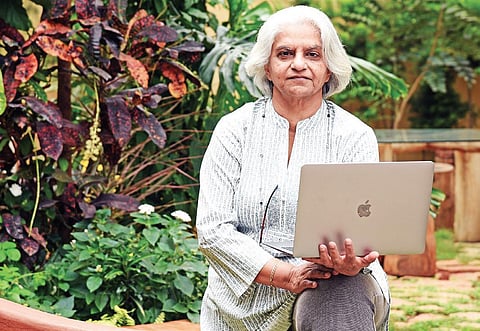

BENGALURU: Bangalorean Jo Thyagarajan’s brainchild and ‘cloud school’, Meghshala is making waves across the country. After winning hearts and minds in its home state, Karnataka, where it reached more than 130 rural schools within a couple of years, it is now all set to conquer the North East. Early in the new year, Meghshala will start operations in Sikkim.
A six-month training of trainers intervention has just been completed in Manipur, and a third state Meghalaya has evinced strong interest in the initiative. Significantly, all these interventions are in collaboration with the state governments – a process which gained ground after the Ministry of Human Resources Development recently invited Meghshala to present its success story to other states in the country.
So, what constitutes the Megshala magic? For many, its USP is an app with a difference, where teachers are able to interactively access a host of different multimedia “teach kits.” For others, it isn’t just the “product” but the “process” that makes the Meghshala magic.
Studies on education in India point to the urgent need on raising quality education especially in government schools. The Annual Survey of Education 2017 report noted that the quality of learning in fact deteriorated in government schools. Meghshala’s significance is precisely in this context.
Teaching in high-end schools, as Jo points out, is all very well. “But if you want to leave any kind of learning impact you better be a part of those corporation schools… (because) without them you are as much use as a small stone in the path of a raging flood. “I had been teaching at the high-end schools all along, which was nuts, because majority of our children are from government schools.” She realised she need to change tack. She invested her savings in a trust in 2014 - and Meghshala was born.
The challenge was complex: Addressing scalability and quality. “The idea of a great teacher may have stood the test of time,” she says, adding, “But s/he can teach at most about 10 or 15 children at a time. The point is to take it to scale. (And) when you go to scale you tend to lose the integrity of the product. So, how do you keep the integrity and still scale?” The answer came in the production of multi-media teach kits, put in place through a learning management system and developed by “master teachers”. Each teach kit lesson comprises interactive audio/ video aids and can be easily accessed by teachers through a hand-held device and projected on a screen or wall.
In addition to providing the hardware kit which includes a tablet and projector, it now offers a revamped Meghshala android application by which teachers in most parts of the world can access (its) content for free. The accent is not just on access but also on inclusion and therefore on translations and disseminating content in local languages.